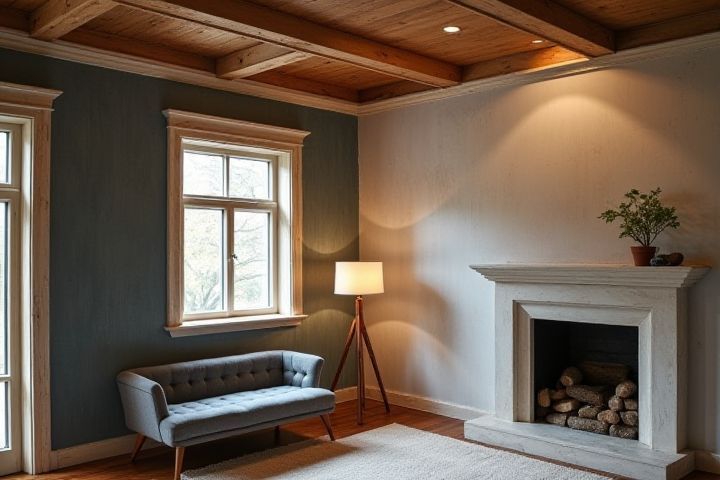
To effectively soundproof your house, consider using acoustic panels on walls and ceilings, which absorb sound waves and reduce noise transmission. Installing double-glazed windows not only enhances energy efficiency but also minimizes outside disturbances significantly. Sealing gaps around doors and windows with weatherstripping or soundproofing caulk can prevent sound leaks, creating a more serene indoor environment. Adding heavy rugs or carpets on floors helps dampen noise from foot traffic, while heavy curtains can further block external sounds. Your choice of building materials can also play a crucial role; dense materials like masonry or specialized soundproof drywall improve overall sound insulation.
How To Soundproof A House Effectively
Use thick carpets and rugs.
Thick carpets and rugs can significantly enhance soundproofing in your home by absorbing sound waves that travel through floors. Opt for plush materials with density ratings of at least 30 ounces per square yard to maximize sound absorption. Layering rugs can provide further insulation, up to 50% more sound dampening in some cases, especially in high-traffic areas. By strategically placing these textiles in rooms where noise is a concern, you create a quieter, more serene environment.
Install acoustic wall panels.
To effectively soundproof your house, installing acoustic wall panels is a crucial step. These panels absorb sound waves, reducing noise transfer between rooms and minimizing echoes. Opt for high-density materials, such as fiberglass or foam, which enhance sound absorption capabilities. You can enhance your results by strategically placing these panels in areas with high noise activity, such as home theaters or music studios.
Apply weatherstripping to doors and windows.
Applying weatherstripping to doors and windows significantly enhances your home's soundproofing capabilities. This process involves sealing gaps and openings where noise can infiltrate, effectively creating a barrier against external sounds. Choose high-quality weatherstripping materials such as foam tape or V-strip for optimal results, ensuring a snug fit along all edges. By addressing these vulnerable areas, you not only minimize sound leakage but also improve energy efficiency in your home.
Add mass-loaded vinyl barriers.
Mass-loaded vinyl barriers are an effective solution for soundproofing your house, as they significantly block sound transmission due to their density and flexibility. Installing these barriers on walls, floors, and ceilings can help minimize noise pollution from both outside and neighboring rooms. To ensure maximum effectiveness, consider adding them behind drywall or cladding, sealing edges with acoustical caulk to eliminate gaps. Incorporating mass-loaded vinyl into your soundproofing strategy not only enhances your home's acoustics but also contributes to a quieter and more comfortable living environment.
Use double or triple-pane windows.
Using double or triple-pane windows significantly enhances soundproofing in your home by creating multiple layers of glass that reduce noise infiltration. These windows feature air or argon gas-filled spaces between the panes, which act as sound barriers, minimizing outside disturbance. Opting for high-quality window frames and proper sealing methods can further improve their effectiveness against sound. You'll notice a remarkable difference in tranquility, making your living environment more peaceful and conducive to relaxation.
Install door sweeps.
Installing door sweeps is a crucial step in effectively soundproofing your house. These simple yet effective devices seal the gap between the bottom of your door and the floor, minimizing sound transmission and energy loss. When selecting door sweeps, consider materials such as rubber or vinyl, which provide excellent insulation and durability. You can enhance your soundproofing efforts by ensuring that the door sweep fits snugly and is regularly maintained to prevent wear and tear.
Seal any gaps or cracks.
Sealing any gaps or cracks is crucial for effective soundproofing in your home. Begin by inspecting areas around windows, doors, and walls for openings where sound can infiltrate. Use acoustical caulk for smaller gaps, as it remains flexible and adheres well to various materials. For larger cracks, consider applying weatherstripping or foam sealant, ensuring a tight seal that minimizes noise transmission and enhances your living environment.
Hang heavy curtains or drapes.
Hanging heavy curtains or drapes is an effective method for soundproofing your home, as they can significantly dampen noise and absorb sound waves. Opt for curtains made from dense materials like velvet or thick polyester, which provide better insulation against outside sounds. Ensure that the curtains extend beyond the window frame and touch the floor to create a seal that minimizes sound leakage. For optimal results, consider adding a layer of noise-reducing liner or interlining between the fabric layers to enhance their sound-absorbing qualities.
Use soundproofing paint.
Soundproofing paint is a specialized product designed to reduce noise transmission within your home walls. This thick, dense paint contains sound-absorbing materials that help dampen sound waves, making it particularly effective for bedrooms, home theaters, and shared walls. When applying soundproofing paint, ensure that surfaces are clean and primed to maximize adhesion and performance. You can enhance its effectiveness by layering it with other soundproofing materials, like acoustic panels or sound-dampening curtains, for improved results.
Enhance attic insulation.
Enhancing attic insulation can significantly improve your home's soundproofing by minimizing noise transfer between the attic and living spaces. Use dense, high-quality insulation materials, such as spray foam or cellulose, which can provide a Sound Transmission Class (STC) value of up to 50, effectively reducing ambient noise levels. Ensure that insulation is applied uniformly, paying special attention to gaps and seams, as even small leaks can compromise soundproofing efficiency. By investing in superior attic insulation, you not only create a quieter environment but also improve your home's energy efficiency, potentially reducing heating and cooling costs by up to 20%.
